RBI Leadership Team
Co-Directors
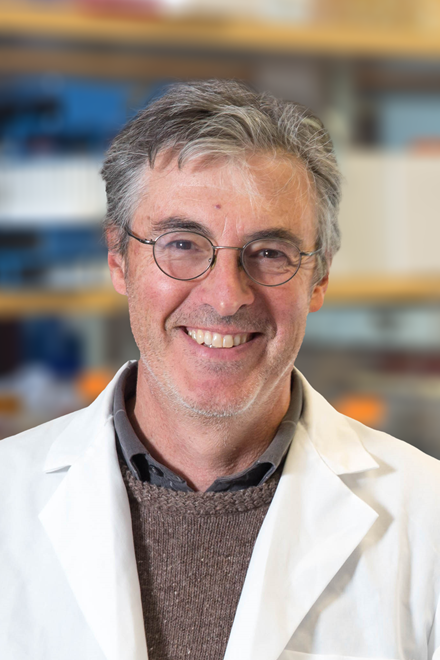
David Bentley, PhD
Dr. Bentley is Professor of Biochemistry and Molecular Genetics as well as co-founder and current co-director of the University of Colorado-School of Medicine RNA Bioscience Initiative (RBI). He came to Colorado in 1998 from the Amgen Institute-University of Toronto (1995-1998). Dr. Bentley’s research has made important contributions to understanding gene expression in normal and cancer cells through investigations of how genetic information is transcribed from DNA into messenger RNA (mRNA). His “mRNA factory” model has gained widespread acceptance and stimulated a new area of research focused on integration of different steps in mRNA biogenesis. To date, Dr. Bentley has published 90 research articles focused on RNA. In addition to his numerous contributions to the fundamental study of RNA biology, Dr. Bentley has trained 11 postdoctoral fellows and 19 PhD level graduate students and mentored many undergraduate/high school interns. He has further served the scientific community internationally, nationally, and locally through his work as an editorial board member (Transcription, Molecular and Cellular Biology, EMBO Reports) invited speaker, grant panel member (NIH, Boettcher), director of CU-SOM Biomedical Sciences Graduate Program (2007-2010), and chair/co-chair/participant in a variety of other essential committees. Dr. Bentley earned his PhD from Cambridge University, Cambridge, U.K. (1982) and completed his postdoctoral training at the Fred Hutchinson Cancer Research Center, Seattle, Washington, USA (1987). Visit the Bentley Lab website for more information.

Jay Hesselberth, PhD
Dr. Hesselberth is Associate Professor of Biochemistry and Molecular Genetics as well as current co-director of the University of Colorado-School of Medicine RNA Bioscience Initiative (RBI). He came to Colorado in 2010 after completing his postdoctoral fellowship at the University of Washington, Seattle, WA. Dr. Hesselberth’s research focuses on RNA damage and repair, and development of single-cell technologies that advance understanding of molecular dissemination in living organisms. In 2020 he was awarded a prestigious NIH Director’s Transformational Research Award for this work. To date, Dr. Hesselberth has published 58 research articles focused on RNA and other aspects of genetic regulation and holds three patents for various RNA technologies. He regularly teaches graduate-level classes in bioinformatics and computational methods, serves as the faculty advisor for the RBI Informatics Fellows Program, and has trained 11 postdoctoral fellows and 9 PhD level graduate students to date. Dr. Hesselberth earned his PhD from University of Texas at Austin, Austin TX (2003). Visit the Hesselberth Lab website for more information.
Core Faculty (in alaphabetic order)

Sujatha Jagannathan, PhD
Dr. Jagannathan is Assistant Professor of Biochemistry and Molecular Genetics, core member of the University of Colorado-School of Medicine RNA Bioscience Initiative (RBI), and a faculty leader of the Colorado RNA Club. She was recruited to Colorado in 2018 as part of the initial talented, young investigator RBI cohort. Dr. Jagannathan’s research applies both computational biology and molecular biology to understand mRNA translation and protein stability in FSHD, a form of muscular dystrophy. She has published 17 research articles on FSHD, and other topics related to RNA localization within cells, establishing herself as a leader in the field of RNA and protein processing in FSHD. In 2019 she received a highly competitive National Institute of General Medical Sciences Maximizing Investigator’s Research Award for Early Stage Investigators. Dr. Jagannathan earned her PhD from Duke University, Durham, NC (2013) and competed her postdoctoral training at the Fred Hutchinson Cancer Research Center, Seattle, Washington (2017). Visit the Jagannathan Lab website for more information.
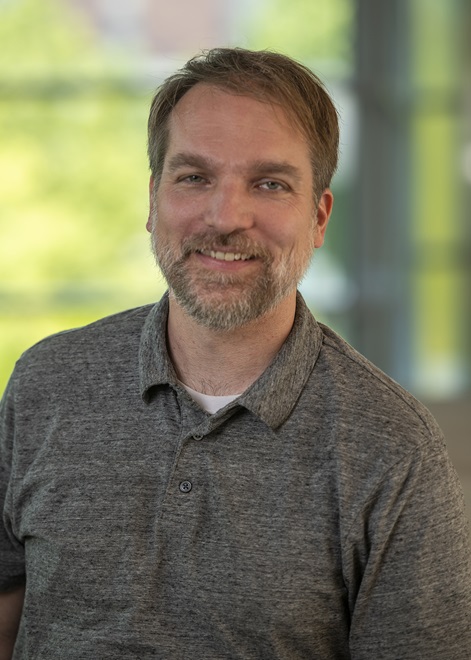
Aaron Johnson, PhD
Dr. Johnson is Associate Professor of Biochemistry and Molecular Genetics as well as co-director of the CU-SOM Biomedical Sciences PhD Program, and director of education for the RNA Bioscience Initiative (RBI). He came to Colorado in 2012 after completing his postdoctoral fellowship at Harvard Medical School, Boston, MA. Dr. Johnson’s research focuses on normal and disease-associated gene regulation, including that driven by cancer-causing noncoding RNAs. Recently, his laboratory proposed a new model for how a specific noncoding RNA, called HOTAIR, chooses its target genes via RNA-RNA matchmaking. Overexpression of HOTAIR in cancer leads to aberrant gene silencing that promotes aggressive cancer characteristics. By studying how this and other noncoding RNAs work at the molecular level, the Johnson Lab aims to discover how to control cancer-causing RNAs and to reset normal cellular states. To date, Dr. Johnson has published 27 research articles focused on RNA and other aspects of genome regulation. He regularly teaches graduate-level classes in molecular biology and RNA Biology in Disease, serves as the faculty advisor for the RBI Summer Internship Program, and has trained 8 postdoctoral fellows and 8 PhD level graduate students to date. Dr. Johnson has a particular passion for Science Technology Engineering Mathematics (STEM) education and has been instrumental in expanding the reach of CU-SOM to include undergraduates and high school students, particularly those from under-represented communities. Dr. Johnson earned his PhD from Rockefeller University, New York, NY (2006). Visit the Johnson Lab website for more information.

Neelanjan Mukherjee, PhD
Dr. Mukherjee is Assistant Professor of Biochemistry and Molecular Genetics and co-director of the RNA Bioscience Initiative (RBI) Summer Internship Program. He was recruited to Colorado in 2017 as part of the initial talented, young investigator RBI cohort. The goal of Dr. Mukherjee’s research is to quantitatively understand human RNA regulatory networks and how their dysregulation impacts human disease. His laboratory employs a combination of experimental and computational approaches to investigate normal and aberrant RNA regulation, particularly as it relates to production of steroid hormones and cancer. He has published 29 research articles on various aspects of RNA systems biology. In 2019 Dr. Mukherjee was designated a Boettcher Investigator after being selected for a prestigious Webb-Waring Biomedical Research Award from the Boettcher Foundation. Dr. Mukherjee earned his PhD from Duke University, Durham, NC (2010) and competed his postdoctoral training at the Berlin Institute for Medical Systems Biology, Berlin, Germany (2017). Visit the Mukherjee Lab website for more information.
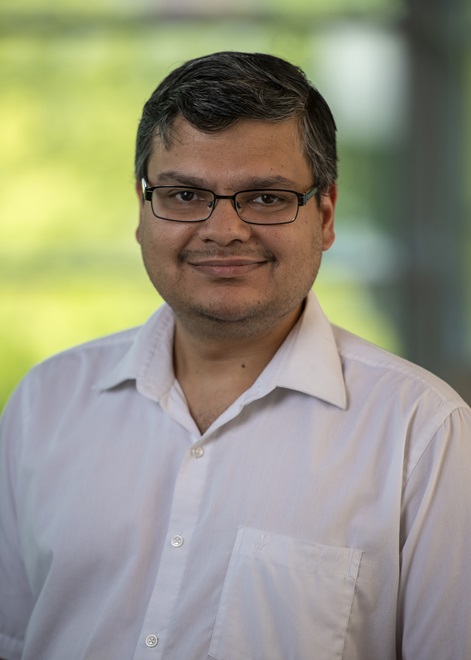
Srinivas Ramachandran, PhD
Dr. Ramachandran is Assistant Professor of Biochemistry and Molecular Genetics and core member of the University of Colorado-School of Medicine RNA Bioscience Initiative (RBI). He was recruited to Colorado in 2018 as part of the initial talented, young investigator RBI cohort. Dr. Ramachandran’s research applies computational biology, genomics, biochemistry, and structural biology to understand chromatin dynamics and cellular memory in normal development and cancer; his laboratory also focuses on creation of diagnostic techniques to make healthcare more equitable and affordable. He has published 33 research articles on various topics related to genome biology, including the role of chromatin in the regulation of mRNA transcription. In 2020 Dr. Ramachandran was selected as a Pew-Stewart Scholar for Cancer Research, a highly competitive and prestigious award given by the Pew Charitable Trusts in partnership with the Alexander and Margaret Stewart Trust. Dr. Ramachandran earned his PhD from the University of North Carolina at Chapel Hill, Chapel Hill, NC (2012) and competed his postdoctoral training at the Fred Hutchinson Cancer Research Center, Seattle, Washington (2017). Visit the Ramachandran Lab website for more information.
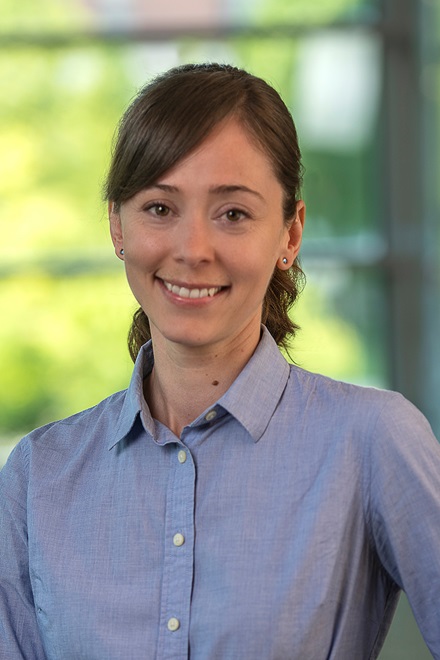
Olivia Rissland, D Phil
Dr. Rissland is Assistant Professor of Biochemistry and Molecular Genetics and core member of the University of Colorado-School of Medicine RNA Bioscience Initiative (RBI). She was recruited to Colorado from the University of Toronto in 2017 as part of the initial talented, young investigator RBI cohort. The over-arching goal of Dr. Rissland’s research is to decipher the connections between translation and mRNA decay. Her lab uses a combination of classical molecular biology techniques and transcriptome-wide approaches to understand the fundamental mechanisms that control gene expression and to explore how these pathways are mis-regulated in disease. She has published 26 research articles on these and other topics related to RNA Biology. In 2021 Dr. Rissland received a prestigious National Science Foundation CAREER award, given in support of “early-career faculty who have the potential to serve as academic role models in research and education and to lead advances in the mission of their department or organization.” Dr. Rissland earned her D. Phil. from the University of Oxford, Oxford, UK (2008), where her studies were funded by a Rhodes Scholarship. She competed her postdoctoral training at the Whitehead Institute for Biomedical Research, Cambridge, MA, (2014). Visit the Rissland Lab website for more information.
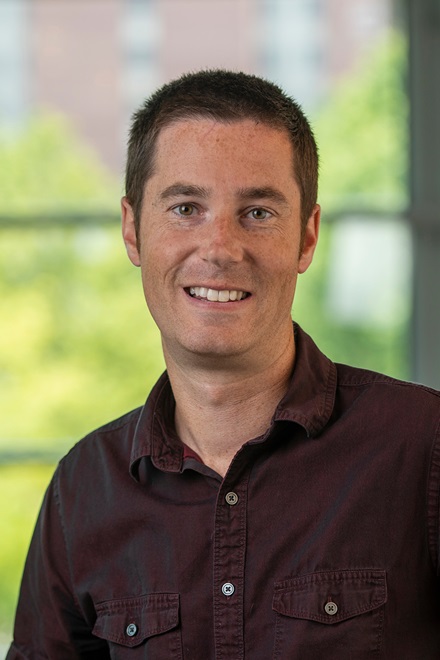
J Matthew Taliaferro, PhD
Dr. Taliaferro is Assistant Professor of Biochemistry and Molecular Genetics and core member of the RNA Bioscience Initiative (RBI). He was recruited to Colorado in 2017 as part of the initial talented, young investigator RBI cohort. Dr. Taliaferro’s research focuses on the regulation of RNA localization and spatial organization within cells. His laboratory uses high-throughput screening, functional genomics, computational biology, and classical molecular and cell biology to study how faulty regulation of RNA localization contributes to development of neurological diseases. He has published 26 research articles on various aspects of RNA and genome biology, designed several unique software packages for analyzing large RNA sequencing data sets, and developed an RNA proximity labeling technique called Halo-seq. Dr. Taliaferro is the recent recipient of two prestigious awards – a Webb-Waring Biomedical Research Award from the Boettcher Foundation (2018) and a Medical Research Award from WM Keck Foundation (2021, co-won with colleague Chad Pearson, PhD). Dr. Taliaferro earned his PhD from the University of California, Berkeley, Berkeley, CA (2012) and completed his postdoctoral training at the Massachusetts Institute of Technology, Cambridge, MA (2017). Visit the Taliaferro Lab website for more information.
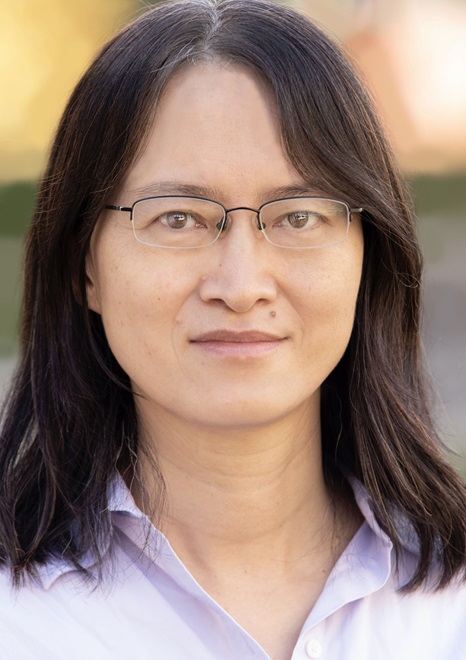
Rui Zhao, PhD
Dr. Zhao is Professor of Biochemistry and Molecular Genetics. She started her lab in the Department of Biochemistry and Molecular Genetics in 2004 after serving as an Instructor in the Department for 3 years. Dr. Zhao’s research focuses on understanding the molecular mechanism of pre-mRNA splicing. Her lab has successfully studied the structure and function of a number of spliceosomal proteins and complexes using a combination of yeast genetics, biochemistry, crystallography, and cryo-EM approaches. For example, her lab determined the cryo-EM structure of yeast U1 snRNP, offering insight into alternative splicing in higher eukaryotes. Their structure of the spliceosomal P complex provided a direct visualization of secondary structures in pre-mRNA and its role in splice site recognition, how 3’ splice site is recognized, and the mechanism of action of spliceosomal RNA helicases. They have also determined the cryo-EM structure of the yeast spliceosomal E complex, which in combination with biochemical analyses, revealed a unified mechanism for intron definition, exon definition, and back-splicing that should inspire many follow up experiments to test this model. Visit the Zhao Lab website for more information.
Other Team Members
